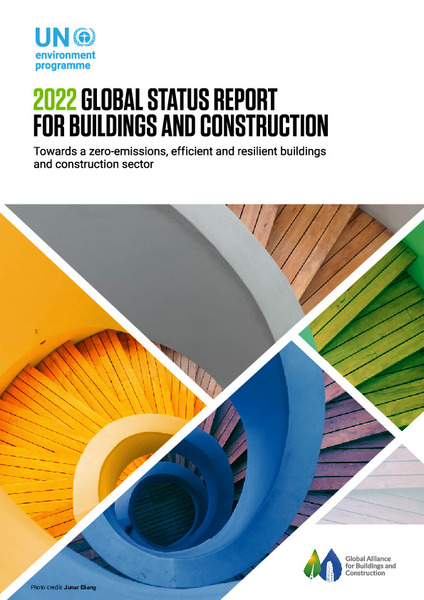| dc.contributor | Economy Division | en_US |
| dc.contributor.author | United Nations Environment Programme | en_US |
| dc.contributor.other | Hamilton, Ian | en_US |
| dc.contributor.other | Kennard, Harry | en_US |
| dc.contributor.other | Rapf, Oliver | en_US |
| dc.contributor.other | Kockat, Judit | en_US |
| dc.contributor.other | Zuhaib, Sheikh | en_US |
| dc.contributor.other | Toth, Zsolt | en_US |
| dc.contributor.other | Barrett, Margaux | en_US |
| dc.contributor.other | Milne, Caroline | en_US |
| dc.contributor.other | Global Alliance for Buildings and Construction | |
| dc.coverage.spatial | Global | en_US |
| dc.coverage.spatial | Africa | en_US |
| dc.coverage.spatial | Finland | en_US |
| dc.coverage.spatial | India | en_US |
| dc.coverage.spatial | Denmark | en_US |
| dc.coverage.spatial | Indonesia | en_US |
| dc.coverage.spatial | Colombia | en_US |
| dc.date.accessioned | 2022-11-07T09:23:34Z | |
| dc.date.available | 2022-11-07T09:23:34Z | |
| dc.date.issued | 2022-11 | |
| dc.identifier.isbn | 978-92-807-3984-8 | en_US |
| dc.identifier.other | DTI/2482/PA | en_US |
| dc.identifier.uri | https://wedocs.unep.org/20.500.11822/41133 | |
| dc.description | Decarbonizing the buildings sector by 2050 is critical to delivering these emission cuts – and to addressing the wider triple planetary crisis of climate change, nature and biodiversity loss, and pollution and waste. However, as the 2022 Buildings Global Status Report shows, the sector is not making the deep systemic changes needed to get on the path to this goal. Building sector energy intensity did not improve in 2021 and renewable energy growth in buildings remains modest, although green building certification are improving. Yet, as the report shows, the sector can change. By following the recommendations in this report, the sector can catch up and create buildings that are zero-carbon, resource efficient and resilient. | en_US |
| dc.format | Text | en_US |
| dc.language | English | en_US |
| dc.rights | Public | en_US |
| dc.subject | building industry | en_US |
| dc.subject | construction industry | en_US |
| dc.subject | energy efficiency | en_US |
| dc.subject | low carbon economy | en_US |
| dc.subject | COVID-19 | en_US |
| dc.subject | carbon emission | en_US |
| dc.subject | climate | en_US |
| dc.subject | building | en_US |
| dc.subject | green building | en_US |
| dc.subject | Africa | en_US |
| dc.subject | building material | en_US |
| dc.subject | West Africa | en_US |
| dc.subject | Finland | en_US |
| dc.subject | India | en_US |
| dc.subject | Denmark | en_US |
| dc.subject | Colombia | en_US |
| dc.subject | net zero carbon | en_US |
| dc.subject | Indonesia | en_US |
| dc.subject | European Union | en_US |
| dc.title | 2022 Global Status Report for Buildings and Construction: Towards a Zero‑emission, Efficient and Resilient Buildings and Construction Sector | en_US |
| wd.identifier.sdg | SDG 7 - Affordable and Clean Energy | en_US |
| wd.identifier.sdg | SDG 9 - Industry, Innovation and Infrastructure | en_US |
| wd.identifier.sdg | SDG 12 - Responsible Consumption and Production | en_US |
| wd.identifier.sdg | SDG 13 - Climate Action | en_US |
| wd.topics | Climate Action | en_US |
| wd.topics | Finance and Economic Transformations | en_US |
| wd.identifier.pagesnumber | 101 p. | en_US |





